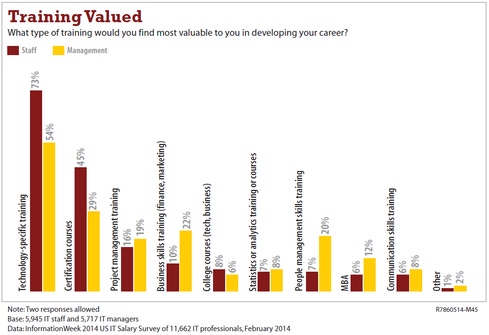IT Certifications: 3 Ways To Judge Value
We've debated the worth of technical certifications for decades. Here's how to determine if a program is worth your time and money.

the skills and knowledge needed to do the work. Proxy test-taking is also a real problem. All these factors contribute to the number of individuals who have certifications but not skills.
Of course, boosting security increases the complexity and cost of getting candidates through the process, so vendors may respond by increasing participation to offset the cost of protecting program integrity. Here are three questions to ask:
Does the vendor use strict security procedures, such as limiting who can take exams and how often they can retest?
Does the vendor use tools such as biometrics to validate who is taking the exams?
Does the vendor view certification as an independent process, or is it simply a marketing tool that puts sales and market goals ahead of exam integrity?
3. Determining competence
Unfortunately, even the most stringent security efforts cannot address the final complaint: the inability of exams to measure competence.
Fundamentally, the problem is the perception that multiple-choice, standardized exams are incapable of measuring competence. In other words, they're designed to measure knowledge, while competence is the efficient and successful application of knowledge. A common perception is that only practical, lab-based exams are capable of determining a candidate's competence.
In reality, multiple-choice exams can measure a lot more than many people understand, and practical exams are much more limited than many realize. The degree to which multiple-choice exams can determine competence has to do with the way they're developed and the cognitive complexity of questions. Here are two questions to ask:
Is the exam written so a candidate can regurgitate a memorized response, or is it written at a level that requires her to analyze and evaluate information to arrive at the correct answer?
Do the exams cover real-world deficiencies or risks that require experienced application of the technology, or do they assume an "ideal" world that exists only in marketing brochures?
A well-designed exam can differentiate competent candidates from weak ones. Certainly anyone can guess a few correct answers, but the exam should take that into account and ensure that candidates cannot pass strictly on the basis of lucky guesses.
Many employers gravitate toward certifications that require practical, lab-based examinations that require candidates to demonstrate their capability, arguing that these determine competence more effectively than multiple-choice exams. While practical exams can be great for showing competence, their scope can be limited. They also have other limitations: They're more expensive to create and administer, measuring success can be subjective, and they often sacrifice breadth of knowledge for depth within a limited domain. In short, a certification that's based on only a practical exam remains subject to the other two validity issues and does not by itself guarantee that any given candidate will perform competently in the varied contexts of the real world.
Ideally, certification programs should use multiple-choice exams of escalating complexity to identify which candidates are most likely to have a good breadth of knowledge, and then subject them to a practical exam that lets them demonstrate their ability to apply that knowledge.
The takeaway
In an ideal world, certifications have value and provide the real-world, job-specific skills employers are looking for. When evaluating the validity of any certification, ask these questions:
Does it measure the skills we need in our organization?
Does the vendor have sufficient integrity that we can be sure candidates who have the certification actually earned it?
Finally, is the certification designed to promote the competent application of skills and knowledge in the real world?
To get the full value from certifications, CIOs and hiring managers must start asking the right questions.
Can the trendy tech strategy of DevOps really bring peace between developers and IT operations -- and deliver faster, more reliable app creation and delivery? Also in the DevOps Challenge issue of InformationWeek: Execs charting digital business strategies can't afford to take Internet connectivity for granted.
About the Author
You May Also Like






